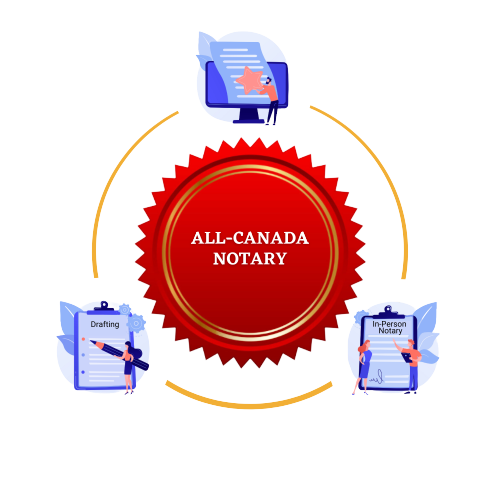An Affidavit of Title (Affidavit of No Lien) is a critical document in the real estate process, providing assurance to both sellers and buyers that the property title is clear of encumbrances, liens, or disputes. Especially for the Canadian notary public, understanding and facilitating the creation of an Affidavit of Title is crucial for a smooth property transfer. This article sheds light on the Affidavit of Title in real estate transactions for legal professionals and the general public.

What is an Affidavit of Title / Affidavit of No Lien?
An Affidavit of Title is a sworn declaration by the property seller affirming ownership and the absence of legal claims, liens, or disputes against the property. This document is pivotal in the real estate transaction process, providing peace of mind to all parties involved. The Affidavit of Title is specifically designed to safeguard the interests of the buyer and lender, ensuring the property transaction is free from legal obstacles.
The Legal Framework in Canada
The legal framework governing the Affidavit of Title in Canada includes federal and provincial regulations. The notary public plays a vital role in this process, verifying the document’s accuracy and compliance with legal standards.
Contents of an Affidavit of Title
The Affidavit of Title typically encompasses several key components:
Affiant’s Information:
- Full Name: The complete legal name of the person making the affidavit, known as the affiant.
- Address: The current residential or business address of the affiant.
- Contact Details: Includes phone number, email address, and any other relevant contact information.
- Relationship to the Property: Clarifies the affiant’s connection to the property, whether as owner, legal representative, or in another capacity.
Property or Asset Description:
- Legal Description: A formal description of the property as recorded in public records, detailing the precise boundaries and dimensions.
- Address: The physical location or street address of the property.
- Identification Details: Any additional information that helps in identifying the property, such as parcel or lot numbers.
Statement of Existing Mortgages, Liens, or Encumbrances:
- A declaration affirming that the property or asset is not subject to any liens, mortgages, or encumbrances.
Supporting Documentation:
- Title Deeds: Documents that evidence the transfer of ownership to the current owner.
- Property Records: Records from public archives showing the history of the property, including previous ownerships.
- Receipts of Payments: Proof of settlement of any debts or obligations related to the property, such as mortgage payments or lien settlements.
Signatures:
- Affiant’s Signature: The legal signature of the affiant, asserting the truthfulness and accuracy of the information provided in the affidavit.
- Date: The specific date on which the affidavit was signed.
- Affirmation: A statement by the affiant confirming that all the information provided is true, complete, and accurate to the best of their knowledge.
Notarization:
- The document must be signed in the presence of a notary public or commissioner of oaths.
- Signature and Seal: The notary public’s official seal and signature, certifying the authenticity of the affiant’s signature and the document itself.
Purpose of the Affidavit of Title
Primary purpose of An Affidavit of Title is to provide legal assurance regarding the property’s title, protecting both buyer and seller in several key areas which include:
- Legal Protection for the Buyer: This document ensures that the buyer is safeguarded against potential legal issues that might arise after the purchase. By providing a legal claim over the property, the affidavit helps to protect against judgments that may impact the property. Without it, buyers could face disputes over boundary lines or other legal complexities due to extenuating circumstances related to the property.
- Protection Against Liens: One of the affidavit’s critical roles is to shield the buyer from becoming responsible for existing liens on the property. The affidavit outlines any pending liabilities tied to the property, thereby preventing the new buyer from inadvertently assuming responsibility for these debts.
- Fraud Prevention: The Affidavit of Title acts as a sworn statement by the seller, ensuring that all the property documents are in order and the site is ready for sale. It verifies that the property is not under sale to multiple parties, there are no undisclosed co-owners, all deeds presented are authentic and not forged, and the seller legitimately owns the property. This level of transparency is vital in preventing the buyer from falling victim to fraudulent schemes related to property ownership and sale.
Where Do I Get an Affidavit of Title?
Obtaining and correctly filling out an Affidavit of Title is a process that benefits greatly from professional assistance, and this is where the expertise of a legal professional or a notary public becomes invaluable. Unlike other services that may offer do-it-yourself drafting tools, All-Canada Notary distinguishes itself by providing a more personalized approach. At an affordable fee, our experienced lawyers take on the task of drafting your affidavit to ensure it meets your specific needs without any compromises. This bespoke service guarantees that your document will be crafted with precision, aligning perfectly with the requirements set forth by various institutions and authorities, including the Government of Canada and Service Ontario. Please click here for our drafting service.
When Would I Need an Affidavit of Title?
An Affidavit of Title is essential in transactions requiring clear proof of ownership, such as property sales, mortgage refinancing, or the transfer of valuable assets like vehicles and boats. Its purpose is to confirm the absence of liens and verify the seller’s ownership, ensuring a transparent and secure exchange of property rights.
Do I Need to Have My Affidavit of Title Notarized?
Yes, notarization is a legal requirement, adding a layer of verification and authenticity to the document. The notary public confirms the identity of the signatory and their understanding and agreement to the document’s contents.
Can I Notarize It Online?
With advancements in technology, online notarization is possible and legally valid in Canada, including Ontario. This option provides flexibility and convenience, especially in situations where in-person notarization is challenging.
Creating an Affidavit of Title
To create an Affidavit of Title, one must gather necessary documents, such as proof of ownership and any relevant legal agreements. The affidavit should then be drafted, outlining the property details, the owner’s declarations regarding liens or disputes, and any other pertinent information. Accuracy and thoroughness are paramount to avoid issues during the property transfer process.
Benefits of Having an Affidavit of Title
For sellers, the affidavit is a declaration of their legal right to sell the property. For buyers, it serves as reassurance that their new property is free from undisclosed encumbrances, ensuring a smoother and more secure transaction.
Common Issues and How to Avoid Them
Common pitfalls include incomplete information and discrepancies between documents. To avoid these issues, ensure all information is accurate and fully disclosed. Engaging a notary public early in the process can help identify and resolve potential problems.
The Role of a Canadian Notary Public
In the context of an Affidavit of Title, the Canadian notary public verifies the document, confirming the signatory’s identity and the affidavit’s adherence to legal standards. This verification process is crucial for the document’s acceptance in legal and property transactions.
Case Studies
Illustrative case studies demonstrate the affidavit’s value in real-life scenarios. For example, a property sale nearly fell through due to an undisclosed lien discovered during the process. However, the diligent preparation and verification of the Affidavit of Title by a notary public helped resolve the issue, allowing the transaction to proceed smoothly.
FAQs
Q. Is an Affidavit of Title mandatory for all property transactions?
While requirements can vary, it’s commonly needed for transactions involving the sale or transfer of property to ensure clear title. The Affidavit of Title gives buyers confidence that the property they are purchasing does not have any hidden liens, disputes, or encumbrances, ensuring a clean and clear transfer of ownership.
Q. How long does it take to get an Affidavit of Title notarized?
The process can be relatively quick, especially with online notarization options, often completed within 15 mins, provided all documents are in order.
Q. What if I find a mistake in my Affidavit of Title after it’s been notarized?
It’s essential to correct any errors immediately. A revised affidavit will need to be notarized again.
Q. Can an Affidavit of Title be used for properties outside of Canada?
While the concept is universal, specific requirements and formats may vary by country. Consult a legal professional in the property’s location for guidance.
Q. What are the consequences of submitting a false Affidavit of Title?
Submitting a false affidavit can lead to legal repercussions, including fines and potential criminal charges for fraud.
Q. What legal requirements does an Affidavit of Title meet in Canada?
It complies with both federal and provincial laws, verifying the seller’s legal right to transfer the property and confirming the absence of encumbrances.

